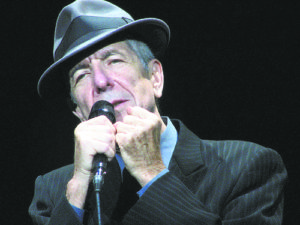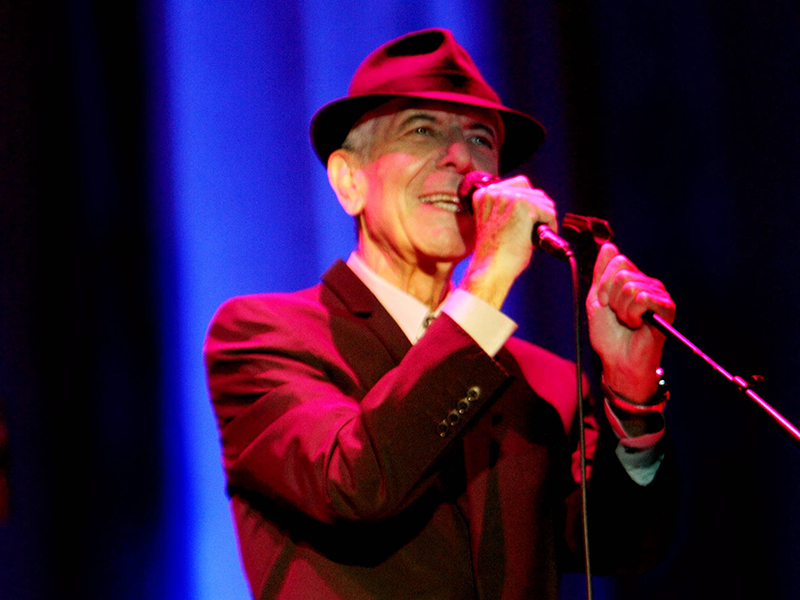In honour of Canada’s 150th birthday, The CJN presents 40 profiles of some of the most prominent Jewish Canadians throughout our history.
When Leonard Cohen died at age 82 last November in his home in Los Angeles, there was an outpouring of grief around the globe. Regardless of nationality, religion, age or even musical preference, the affection and admiration for Cohen was virtually universal.
Although they knew he was superlatively talented, honourable and sexy, his fellow Jewish Montrealers were, nevertheless, awed at the high regard in which he was held. They were also touched that, after decades away, he chose their city as his final resting place.
Singer, songwriter, poet and novelist, Cohen, whose dark good looks and rumbling voice epitomized the brooding artist, was born in 1934 and grew up in Westmount, Que., the scion of a well-to-do and prominent family. He received a thorough grounding in Judaism at home and at Congregation Shaar Hashomayim and, although later in life he would turn to Zen Buddhism for spiritual sustenance, he returned again and again to Jewish sources for inspiration, which often lent his writing a prayerful quality.
On his final album, You Want it Darker, released a month before his death, several songs have clearly Jewish themes, as he sums up his life and ruminates on his imminent demise, leavened by his characteristic wry humour.
To ensure the authenticity of liturgical references, Cohen reached out to the Shaar’s cantor, Gideon Zelermyer, and men’s choir, to sing background vocals for the album, including on the title track, in which Cohen intones, “Hineni, hineni; I’m ready my Lord.”
“These beautiful harmonies have been echoing in my mind since childhood,” he said. The album received unanimous critical acclaim and climbed to No. 1 in Canada.
READ: THE CJN’S SPECIAL COVERAGE OF CANADA’S SESQUICENTENNIAL
Over his career, Cohen was able to bridge the divide between art songs and pop; his music combining mysticism and sensuality. His lyrics were both cerebral meditations and laments over affairs of the heart – all delivered in a voice that grew more gravelly with the years and his gentlemanly manner.
His extensive body of work has been covered by countless musicians around the world.
Although he was in his ninth decade when he passed away, Cohen seemed younger because he was forced to return to the stage in his 70s, after his manager embezzled millions of dollars worth of his assets.
Touring internationally between 2008 and 2013, he won over a new generation of fans, as well as delighted those of an earlier time, who loved his mature persona. Astoundingly, he gave 387 concerts during that period and his albums were topping the charts.
He performed in Israel in 2009, his first concert there since 1975, at Ramat Gan Stadium, near Tel Aviv, where the 47,000 seats sold out in less than a day.
During the Yom Kippur War, Cohen entertained the troops in the Sinai, which was never forgotten. Israeli President Reuven Rivlin and Prime Minister Benjamin Netanyahu issued heartfelt tributes upon his death.

Cohen was a companion of the Order of Canada and among his many honours were a Governor General’s Performing Arts Award and inclusion in the Canadian Folk Music Walk of Fame and the Rock and Roll Hall of Fame –- an indication of how he defied genre. He won eight Juno Awards and a Grammy Lifetime Achievement Award.
Cohen began his career playing country and western music, sporting a buckskin jacket and wielding a guitar, but was at first more interested in writing verse and prose. At McGill University in the 1950s, he came under the influence of the burgeoning poetry scene.
Cohen left Montreal in 1959, living briefly in London and then Greece for several years, and settled in L.A. in the 1960s. But he returned frequently to his native city and maintained a home off St. Laurent Boulevard until his death.
His 1966 novel, Beautiful Losers, was considered too sexually graphic to be mainstream, but today is part of the Canadian literary canon. One of Cohen’s early poetry collections won a Governor General’s Award, which he refused.
He continued to write poetry throughout his life, publishing the bestselling Book of Longing in 2006.
Cohen’s first recording, Songs of Leonard Cohen, was released in 1967 and sold more than 50,000 copies. It included such iconic pieces as Suzanne and So Long, Marianne.
His second album, Songs From a Room (1969), established him as an international artist. In 1970, his concert at the Isle of Wight in Britain drew 600,000 attendants.
Cohen’s signature song, Hallelujah, was introduced on his seventh album, Various Positions, which was released in 1984. During that decade, he moved into the pop mainstream with songs like First We Take Manhattan, Ain’t No Cure For Love and I’m Your Man.
‘I never had a sense of rebellion.’
In the 1990s, he withdrew from show business and became a monk at a Buddhist monastery outside of L.A., where he spent much of his time in silence.
In an interview published in The New Yorker in October, Cohen affirmed that he never rejected his heritage.
“I have a deep tribal sense. I grew up in a synagogue that my ancestors built. I sat in the third row. My family was decent. They were good people, handshake people. So I never had a sense of rebellion,” he said.
To Zelermyer, with whom he corresponded over email for years, Cohen always signed off, “Fraternally, Eliezer” (his Hebrew name).
“I am pleased that my enduring association with the Shaar be known to the congregation, and that our work together reflects our love for the place, the people and the tradition,” he wrote near the end.
In his native province, where Cohen was hailed as a unifying force between francophones and anglophones, at his passing, Mayor Denis Coderre lowered the flag at city hall and, in the National Assembly, all members stood for a moment of silence for an international star who chose to be buried in Quebec soil.



